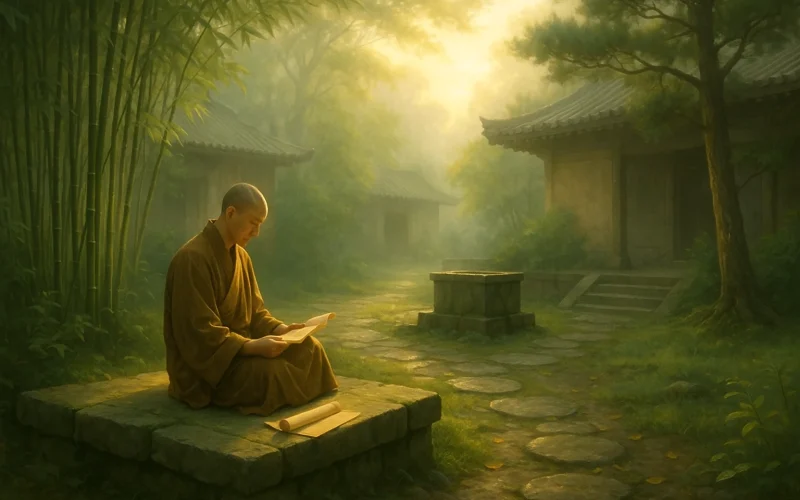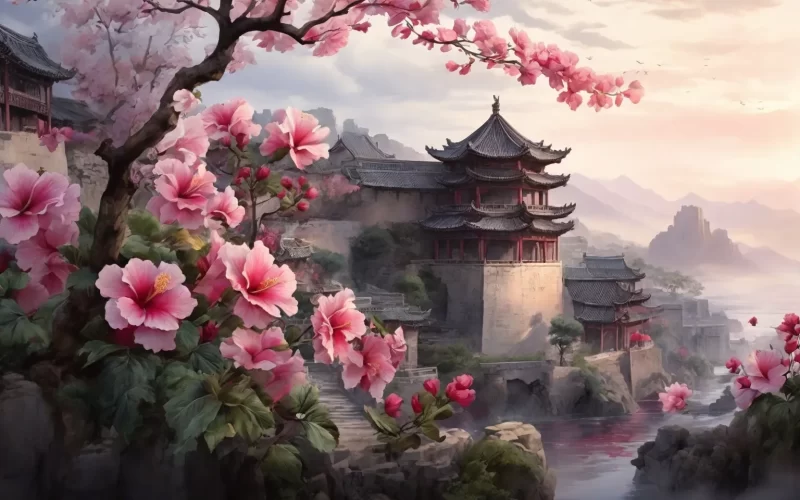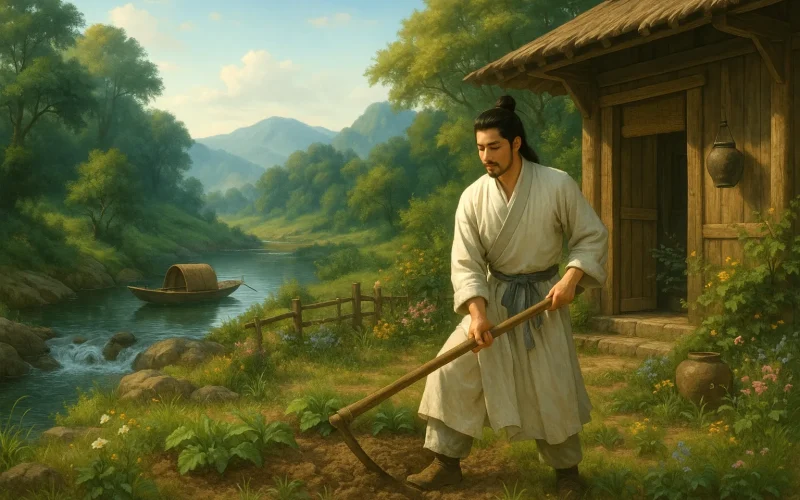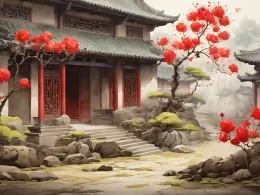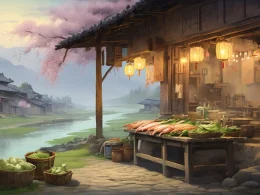I clean my teeth in water drawn from a cold well;
And while I brush my clothes, I purify my mind;
Then, slowly turning pages in the Tree-Leaf Book,
I recite, along the path to the eastern shelter.
...The world has forgotten the true fountain of this teaching
And people enslave themselves to miracles and fables.
Under the given words I want the essential meaning,
I look for the simplest way to sow and reap my nature.
Here in the quiet of the priest’s templecourtyard,
Mosses add their climbing colour to the thick bamboo;
And now comes the sun, out of mist and fog,
And pines that seem to be new-bathed;
And everything is gone from me, speech goes, and reading,
Leaving the single unison.
Original Poem
「晨诣超师院读禅经」
柳宗元
汲井漱寒齿, 清心拂尘服,
闲持贝叶书, 步出东斋读。
真源了无取, 忘迹世所逐;
遗言冀可冥, 缮性何由熟?
道人庭宇静, 苔色连深竹;
日出雾露余, 青松如膏沐。
澹然离言说, 悟悦心自足。
Interpretation
Composed during Liu Zongyuan's exile in Yongzhou, this poem reflects the poet's political disillusionment and solitary melancholy. Turning to Buddhist philosophy and mountain landscapes for spiritual solace, "Morning Visit to Master Chao's Temple to Read Sutras" captures his meditative insights during a dawn scripture-reading session, revealing his quest for transcendence amidst worldly setbacks.
First Couplet: "汲井漱寒齿,清心拂尘服,闲持贝叶书,步出东斋读。"
Jí jǐng shù hán chǐ, qīng xīn fú chén fú, xián chí bèi yè shū, bù chū dōng zhāi dú.
Drawing well-water to rinse morning chill / Brushing dust from robes with purposed will / Palm-leaf scriptures in hand without haste / From eastern study I step to taste
The ritualistic actions—rinsing, dusting, holding scriptures—establish sacred preparation. The deliberate pacing ("without haste") reflects contemplative immersion, while "taste" metaphorically blends physical and spiritual ingestion of wisdom.
Second Couplet: "真源了无取,忘迹世所逐;遗言冀可冥,缮性何由熟?"
Zhēn yuán liǎo wú qǔ, wàng jì shì suǒ zhú; yí yán jì kě míng, shàn xìng hé yóu shú?
Truth's source rejects all grasping hold / Yet fools chase traces manifold / I long to fathom wisdom's trace / But how refine my nature's base?
This philosophical interrogation critiques worldly attachment to superficial signs over essential truth. The rhetorical question exposes the paradox of self-cultivation—how to perfect one's nature when perfection itself may be an illusion.
Third Couplet: "道人庭宇静,苔色连深竹;日出雾露余,青松如膏沐。"
Dào rén tíng yǔ jìng, tái sè lián shēn zhú; rì chū wù lù yú, qīng sōng rú gāo mù.
In the master's silent courtyard space / Moss blends with bamboo's darkened grace / Sunrise lingers in misted dew / Pines glisten with emerald hue
The temple's microcosm emerges through ecological harmony—moss and bamboo forming chromatic continuity, while pines glistening with residual moisture embody nature's effortless purity. This becomes a visual sutra of non-duality.
Fourth Couplet: "澹然离言说,悟悦心自足。"
Dàn rán lí yán shuō, wù yuè xīn zì zú.
In wordless serenity I rest / Awakening's joy fills my breast
The climax achieves epistemic breakthrough beyond language. "Wordless" (离言说) echoes Zen's emphasis on direct experience over textual dependence, while "joy" (悟悦) confirms enlightenment's immanence rather than distant ideal.
Holistic Appreciation
The poem traces a spiritual itinerary from purification (I) through philosophical doubt (II) to aesthetic revelation (III) culminating in noetic fulfillment (IV). This progression mirrors Buddhist practice: preparatory rituals, doctrinal wrestling, meditative absorption, and ultimate realization. Liu's genius lies in weaving these stages seamlessly with natural observation, making the temple environs both literal setting and allegory of mind.
Artistic Merits
- Ritual Precision: Morning ablutions mirror spiritual cleansing
- Dialectical Structure: Moves from negation ("rejects all grasping") to affirmation ("joy fills my breast")
- Ecological Symbolism: Moss-bamboo-pines form a trinity of resilience
- Epistemic Humility: Ends not with triumphal wisdom but contented seeking
Insights
Liu's poem offers an antidote to modern achievement anxiety—his "joy" springs not from mastery but engaged seeking. The temple's ecology models how environments shape consciousness: just as moss thrives in shade, humans flourish in contemplative spaces. For contemporary readers drowning in digital chatter, the "wordless serenity" ideal resonates as both challenge and consolation. Ultimately, the work suggests that exile—physical or psychological—can become sacred space when approached with ritual attentiveness.
Poem translator
Kiang Kanghu
About the poet
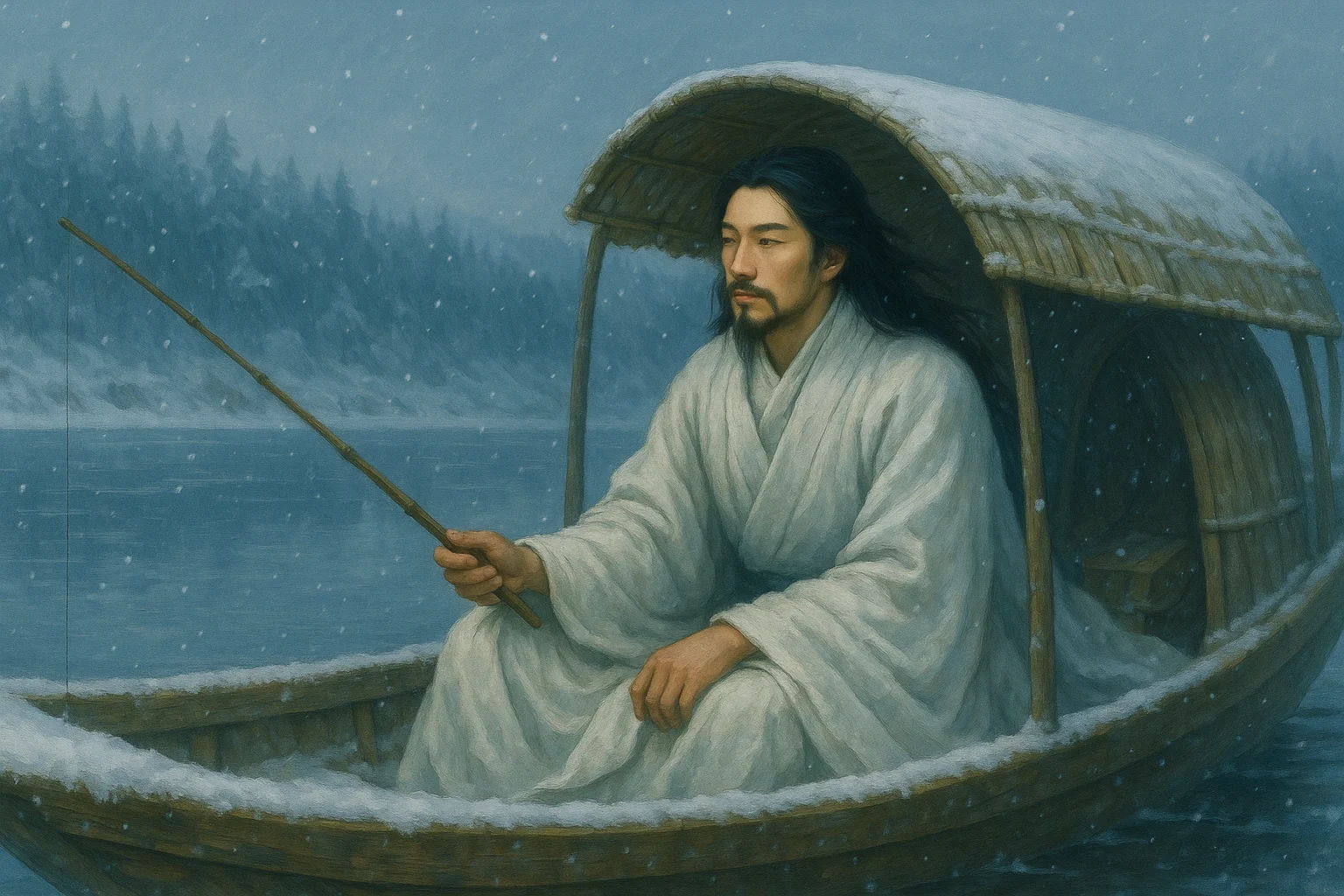
Liu Zongyuan (柳宗元), 773 - 819 A.D., a native of Yongji, Shanxi, was a progressive thinker, brilliant writer, and revolutionary statesman of the Tang Dynasty. Nineteen years before he was born, the An Shi Rebellion broke out, which dramatically changed the Tang Dynasty from prosperity to decline. The subsequent failure of the Yongzhen Reform was a historical tragedy that cut short Liu Zongyuan's political future, but made him one of the leading thinkers and literary figures of the Tang Dynasty.






